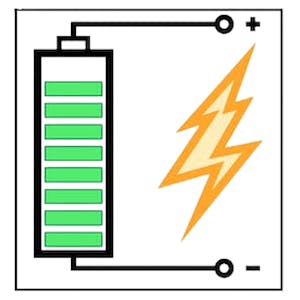Battery Pack Balancing and Power Estimation is an in-depth course that equips learners with the knowledge and skills to design balancing systems and compute remaining energy and available power for battery packs. Through a series of modules, participants will explore various balancing methods, from passive to active, and learn how to estimate available power using simplified and comprehensive cell models.
Throughout the course, students will delve into topics such as evaluating design choices for cell balancing, designing component values for balancing circuits, using simulation tools to assess battery pack balance, and computing remaining energy and available power. The practical approach of the course allows individuals to gain hands-on experience using Octave/MATLAB scripts and simulation tools to understand the intricacies of battery pack balancing and power estimation. By the end of the course, participants will possess the expertise to design balancers and power-limits estimators for lithium-ion battery packs.
Whether aiming to enhance their knowledge in electrical engineering or seeking practical skills in battery management system algorithms, this course offers a comprehensive learning experience for individuals interested in the field of battery technology.
Certificate Available ✔
Get Started / More Info
This course comprises modules that cover passive and active balancing methods, power estimation using simplified and comprehensive cell models, and future battery-management-system algorithms, culminating in a capstone project.
This module provides an in-depth exploration of passive balancing methods for battery packs, covering topics such as the criteria for specifying balancing setpoints, when to balance a battery pack, and various passive balancing circuits. Learners will gain practical insights and engage in discussions to enhance their understanding of this critical aspect of battery technology.
In this module, participants will delve into active balancing methods for battery packs, including actively balancing using capacitor-based and transformer-based circuits, as well as utilizing a shared active bus. The module integrates simulation tools and Octave code to demonstrate the practical implementation of active balancing methods, ensuring a comprehensive learning experience for students.
Through this module, learners will acquire the necessary skills to find available battery power using a simplified cell model. The module covers essential factors to consider when computing available battery power, how to compute power based on cell terminal voltage, and the use of Octave code to compute power limits. Practical quizzes and a comprehensive assessment further reinforce the understanding of power estimation.
Participants will engage in a detailed exploration of power estimation using a comprehensive cell model in this module. The content includes solving for future battery conditions using the bisection algorithm, estimating available power using a comprehensive cell model, and utilizing simulation to compare different power-estimation methods. Through practical quizzes and a final assessment, students will consolidate their knowledge and skills in power estimation.
This module focuses on future battery-management-system algorithms, covering topics such as physics-based ideal-cell models, single-particle reduced-order models, 1-d physics-based reduced-order models, models of degradation mechanisms, and optimized controls using physics-based models. The module concludes with quizzes that challenge learners to apply their understanding in a practical context.
The capstone project module serves as the culmination of the course, allowing learners to apply their acquired knowledge and skills to a real-world project. Participants will have the opportunity to demonstrate their proficiency in designing balancers and power-limits estimators for lithium-ion battery packs, showcasing their comprehensive understanding of the course material.
Internet of Things and AI Cloud is a comprehensive specialization covering the development of IoT products and services, including hands-on learning and a final...
Explore the fascinating world of particle accelerators, from their fundamental technology to their wide-ranging applications in various fields. Delve into RF-systems,...
Natural Gas course provides comprehensive understanding of gas characteristics, system components, safety procedures, and industry formation, catering to career...
The Road to Autonomy: Exploring EV Technologies offers a comprehensive exploration of the fusion of electric propulsion and autonomous driving, providing learners...